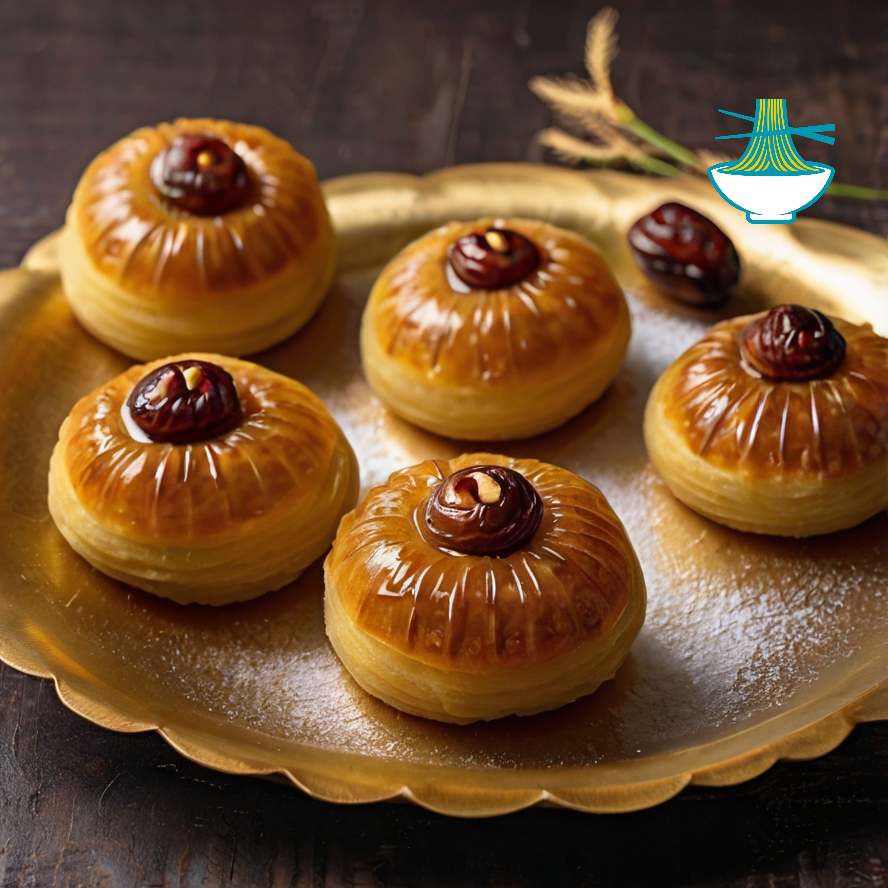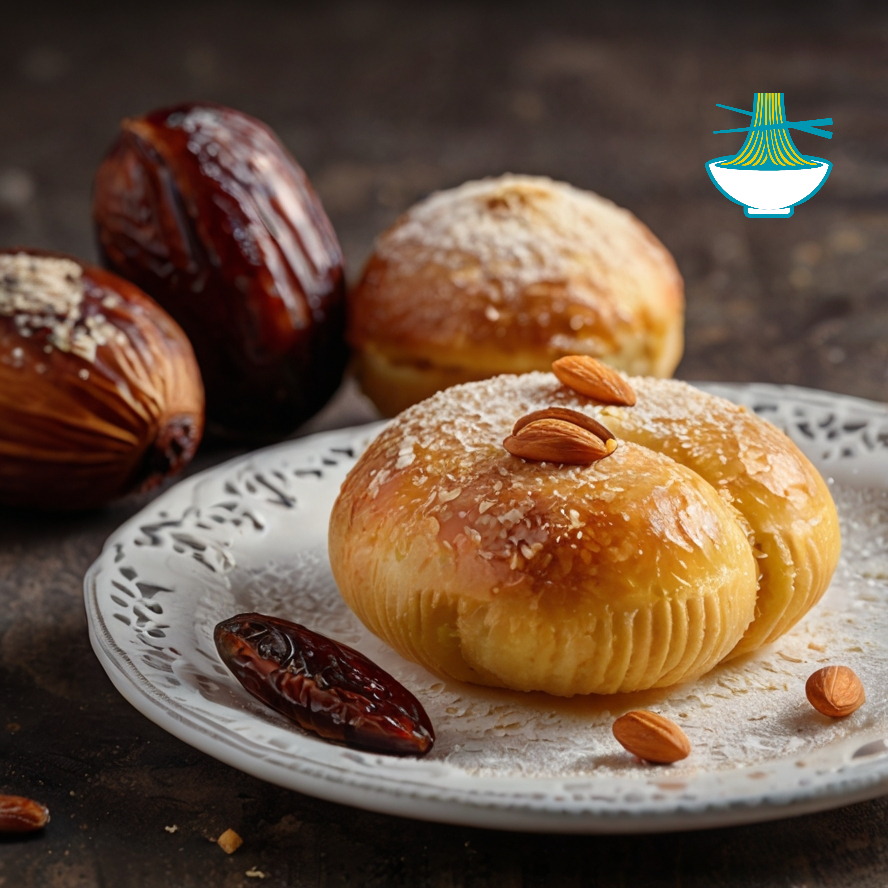Makroudh is a traditional North African sweet pastry, cherished for its rich flavors and delightful texture. Made from semolina dough, it is typically stuffed with a sweet filling of dates or almonds. After shaping, the pastries are fried or baked until golden, then soaked in honey, giving them a luscious sweetness and a sticky, glossy finish. This dessert is often enjoyed during festive occasions and special celebrations.
The origins of Makroudh can be traced back to the ancient Berber communities of North Africa, particularly in regions that are now part of Algeria, Tunisia, and Morocco. Over the centuries, the recipe has evolved, incorporating influences from Arab, Ottoman, and Mediterranean cuisines. Makroudh holds a special place in Maghrebi culture, symbolizing hospitality and the celebration of heritage. Its enduring popularity is a testament to the timeless appeal of its simple yet decadent flavors.
Ingredients:
- 2 cups semolina
- 1/2 cup vegetable oil
- 1/4 cup water
- 1/4 teaspoon salt
- 1/2 teaspoon ground cinnamon
- 1/2 teaspoon ground aniseed (optional)
- 1 cup pitted dates or almonds
- Honey, for soaking
Method:
- In a bowl, combine semolina, vegetable oil, water, salt, cinnamon, and aniseed (if using). Mix until a dough forms.
- Divide the dough into small portions and shape each into a cylinder, then flatten slightly.
- Place a date or almond in the center of each piece of dough and enclose it, shaping into a log.
- Using a knife, make diagonal cuts along the length of each log to create a pattern.
- Heat oil in a deep pan over medium heat. Fry the pastries until golden brown on all sides.
- Remove the pastries from the oil and drain on paper towels to remove excess oil.
- While still warm, soak the pastries in honey for a few minutes.
- Serve the Makroudh at room temperature and enjoy the sweet, sticky goodness!
This recipe yields delicious Makroudh pastries that are perfect for sharing with friends and family during festive occasions or as a delightful treat any time of the year.
Nutrition Value:
Semolina:
- Calories: Approximately 601 kcal per 2 cups
- Carbohydrates: About 126 grams
- Protein: Around 21 grams
- Fat: About 1.5 grams
- Sodium: Negligible
- Cholesterol: None
- Vitamins: Contains small amounts of vitamins B1, B3, and B6
- Minerals: Good source of iron and magnesium
Benefit: Semolina provides a good source of energy from complex carbohydrates and contains important minerals for overall health, particularly iron for oxygen transport and magnesium for muscle function.
Vegetable Oil:
- Calories: Approximately 960 kcal per 1/2 cup
- Carbohydrates: Negligible
- Protein: Negligible
- Fat: About 109 grams
- Sodium: Negligible
- Cholesterol: None
- Vitamins: Contains vitamin E
- Minerals: Negligible
Benefit: Provides energy-dense fat for cooking and contributes vitamin E, an antioxidant that supports immune function and skin health.
Water:
- Calories: None
- Carbohydrates: None
- Protein: None
- Fat: None
- Sodium: None
- Cholesterol: None
- Vitamins: None
- Minerals: None
Benefit: Essential for hydration and facilitating various bodily functions.
Salt:
- Calories: None
- Carbohydrates: None
- Protein: None
- Fat: None
- Sodium: Varies based on type and brand; roughly 590 mg per 1/4 teaspoon
- Cholesterol: None
- Vitamins: None
- Minerals: Provides sodium, which is essential for fluid balance and nerve function but should be consumed in moderation.
Benefit: Enhances flavor, but excessive intake can contribute to high blood pressure.
Ground Cinnamon:
- Calories: Approximately 3 kcal per 1/2 teaspoon
- Carbohydrates: About 1 gram
- Protein: Negligible
- Fat: Negligible
- Sodium: Negligible
- Cholesterol: None
- Vitamins: Contains small amounts of vitamin K
- Minerals: Provides small amounts of calcium and manganese
Benefit: Contains antioxidants and may have anti-inflammatory properties.
Ground Aniseed (optional):
- Calories: Approximately 4 kcal per 1/2 teaspoon
- Carbohydrates: About 1 gram
- Protein: Negligible
- Fat: Negligible
- Sodium: Negligible
- Cholesterol: None
- Vitamins: Contains small amounts of vitamins A and C
- Minerals: Provides small amounts of calcium and iron
Benefit: May aid digestion and provide a subtle licorice flavor.
Pitted Dates or Almonds:
- Calories: Varies based on type and amount; roughly 415 kcal per cup of dates or 529 kcal per cup of almonds
- Carbohydrates: About 110 grams for dates; about 20 grams for almonds
- Protein: About 4 grams for dates; about 20 grams for almonds
- Fat: Negligible for dates; about 46 grams for almonds
- Sodium: Negligible
- Cholesterol: None
- Vitamins: Dates are rich in vitamins B6 and K; almonds are high in vitamin E and some B vitamins.
- Minerals: Dates contain potassium, magnesium, and copper; almonds are a good source of magnesium, phosphorus, and calcium.
Benefit: Dates provide natural sweetness and fiber, along with vitamins and minerals. Almonds contribute healthy fats, protein, and essential nutrients, promoting heart health and satiety.
Honey:
- Calories: Approximately 304 kcal per 1/4 cup (about 85 grams)
- Carbohydrates: About 82 grams
- Protein: Negligible
- Fat: Negligible
- Sodium: Negligible
- Cholesterol: None
- Vitamins: Contains small amounts of vitamin C and folate
- Minerals: Provides small amounts of calcium, iron, and magnesium
Benefit: Natural sweetener with antioxidant properties, may help soothe sore throats and coughs, but should be consumed in moderation due to its high sugar content.


Comments